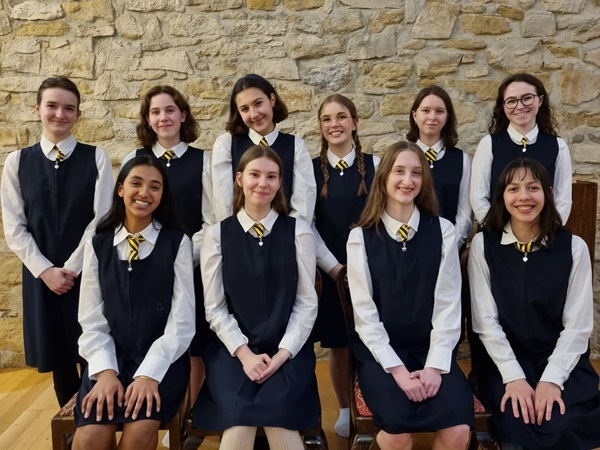 (L-R) Trixie (Caeli Colgan) and Daisy (Kalina Koeva) searching for clues;
Credit: BGT Theatre
(L-R) Trixie (Caeli Colgan) and Daisy (Kalina Koeva) searching for clues;
Credit: BGT Theatre
The BGT English Theatre Company will put on its next show Daisy Pulls It Off in the Room Robert Krieps at Abbaye de Neumünster (neimënster) in Luxembourg-Grund on Wednesday 13, Thursday 14, Friday 15 and Saturday 16 March 2024 at 19:30.
Daisy Pulls It Off is a comedic play by Denise Deegan, with the original production making its debut at the Nuffield Theatre in Southampton in 1983, after which it ran for 1,180 performances in London at the Gielgud Theatre (known as the Globe back then). The play is a parody of life in an English girls’ boarding school in the 1920s; it focuses on adventure stories and a childlike sense of wonder, all the while poking fun at a sense of overblown patriotism and antiquated traditional values.
Chronicle.lu recently had the opportunity to sit down with the two lead actresses and with the director and BGT co-founder Tony Kingston. Seventeen-year-old Kalina Koeva, playing Daisy Meredith, is a student at the European School of Luxemburg. Originally from Bulgaria, she joined the BGT theatre company in 2022 and was cast in the central role of Emily Dickinson in Eloïse Heger-Hedloy's I Can't Tell You - But You Feel It. She was now once again cast in the lead to play a playful “tomboy with a brilliant mind”.
Caeli Colgan, also seventeen years old, will play “funny, excitable, imaginative” Trixie Martin, Daisy’s best friend. Caeli, also a student in her final year at the European School of Luxembourg, first started acting in the chorus of Pirates Productions’ Oliver Twist and Scrooge the Musical. She also performed at FEST 2022 with the European School Drama Group, playing the lead role in Dark Road by Laura Smith. Last year in January, she played Brutus in an all-female, abridged version of Julius Caesar, directed by Tony Kingston at the Luxembourg School Shakespeare Festival.
The two actresses explained that the light-hearted, comedic show drew them to audition for the show as a change from their more serious, “dark” or “experimental” past roles. Both mentioned the excitement to finally act together (as they are good friends in real life as well). One of the main challenges they both described playing their respective characters was acting overtly bubbly in an unironic, genuine way. Both girls are quite childlike in the play, but not “intentionally funny”. Such characters may be less common to play and see for modern audiences. Tony added that this is an interesting shift to observe – plays nowadays may differ in that they have more ironic, or perhaps cynical humour than plays put on 100 years ago. Nevertheless, the two actresses also mentioned there is a joyful and simple element to playing “giggly schoolgirls” all the while portraying a close connection based on true solidarity. Their real-life friendship helped establish this on-stage from the get-go.
Daisy Pulls It Off is set in a 1920s boarding school, which Tony explained is a culturally entrenched notion by now, one he did not feel the need to prepare to immerse himself (or the audience) into. He noted he attended an all-boys school himself. The environment conjured up to most may be a fun, Hogwarts-like setting where everyone “loves school”, or perhaps Eton and an “entitled, rich” background. Nevertheless, he noted this was not a “real” place but an implausible, adventurous one, part of a tradition of boarding school literature stories – a template readily found in the minds of most members of a modern audience. One dated element to get used to in this context, however, may be the overt patriotism displayed in the play, Caeli added, and the “upper-class idea of the performance of duty and honour”.
Because the writer is Irish, the play is not so focused on British ideas of aristocracy, it is more about poking fun at the “Edwardian Britishness” and a few elements of social class, Tony added. The play is mostly about playing pretend and going on adventures – Caeli and Kalina emphasised that children may enjoy the characters’ quests and playfulness, while adult audiences may be more amused by the parodic elements. While this is an entertaining play, one of its takeaways may also be “money doesn’t equate intelligence” as the main character’s social background is different to the other girls’ at the school, Kalina added.
The play has a certain timeless appeal since its original production in the 1980s. According to Tony, this may be because the 1920s setting “takes it away from living memory”. The 1920s are a romanticised time, he highlighted, a time of “great detective stories, ghost stories” and other explorations. For children, the genre of adventure tales may be the appeal, making them feel powerful and a part of it, while for adults, it evokes a certain nostalgia.
The play promises to be an exhilarating adventure - Caeli and Kalina shared some memorable anecdotes, including their first rehearsal of a tricky and fast-paced, precise hockey match, the girls trying on their gymslip uniforms for the first time and taking selfies in the mirror, or the time they had to “make a train on stage”.
The play, directed by Tony Kingston, stars Kalina Koeva, Caeli Colgan, Kim Birel, Bjørn Clasen, Elise Capy-Pietrzak, Cheryl Fairon, Catriona Gillham, Josie Hatch, Rewa Jain, Marc Kaysen and June Lowery, among others.
Tickets cost €20 (€12 for students) and are available via https://www.neimenster.lu/en/events/daisy-pulls-it-off/.

(L-R) Back row: Cheryl Fairon, Hanne Siebens, Kalina Koeva, Caeli Colgan, Alexandra Manafova and Cara O'Sullivan
Front row: Rewa Jain, Elise Capy-Pietrzak, Cailin Reiff and Josephine Hatch.








